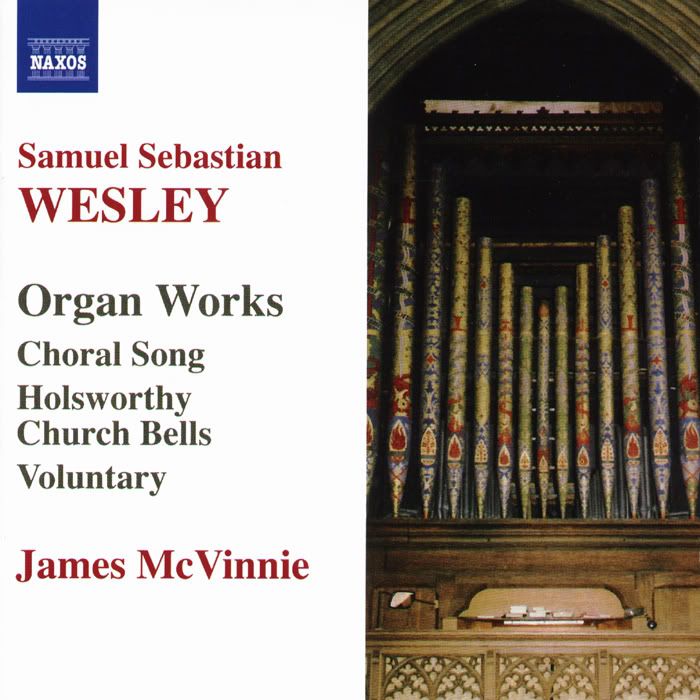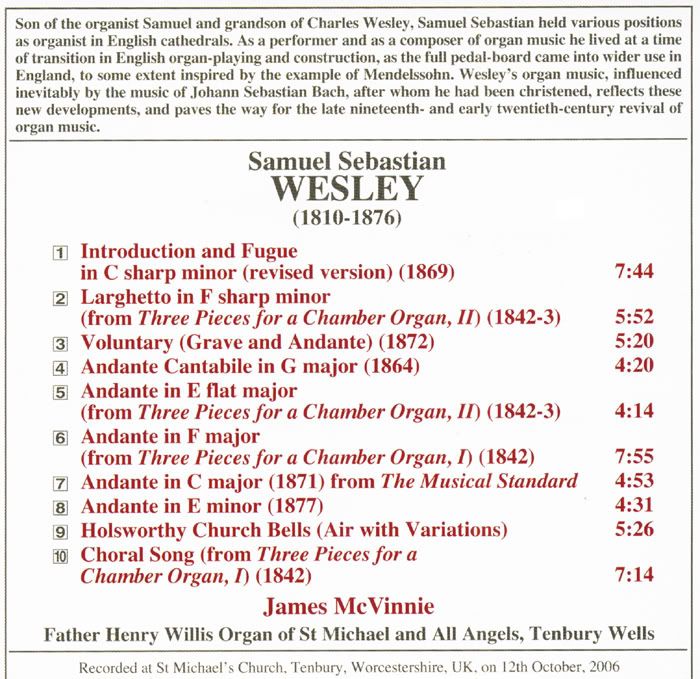 |
| NetLab · Rules · Torrent Tracker · Have a problem? · Eng/Rus |
 Help Help
 Search Search
 Members Members
 Gallery Gallery
 Calendar Calendar
|
| Welcome Guest ( Log In | Register | Validation ) | Resend Validation Email |
|
Posted: 03-01-2009, 22:16
(post 1, #872889)
|
||||||||||||||||||
|
Pro Member Group: Members Posts: 695 Warn:0% |
Samuel Sebastian Wesley (1810 - 1876) Organ Works Label: Naxos, 8.570410 Year: 2007 Performer: James McVinnie - organ Son of the organist Samuel and grandson of Charles Wesley, Samuel Sebastian held various positions as organist in English cathedrals. As a performer and as a composer of organ music he lived at a time of transition in English organ-playing and construction, as the full pedal-board came into wider use in England, to some extent inspired by the example of Mendelssohn. Wesley’s organ music, influenced inevitably by the music of Johann Sebastian Bach, after whom he had been christened, reflects these new developments, and paves the way for the late nineteenth- and early twentieth-century revival of organ music. Whilst this disc does not represent the finest and most dazzling organ repertoire, it certainly comes from a a very important chapter in the history of English organ music. The organ music of S.S. Wesley, son of Samuel, grandson of Charles, is the link between a long tradition of manuals-only organ music and the beginning of a new era characterised by obbligato pedal parts. S.S. Wesley was a renowned organist, though it is surprising that despite his compositional talents and his incredible ability at improvisation, he produced only a small number of compositions. Small, but nonetheless hugely significant, S.S. Wesley’s organ output paved the way for a great revival of organ music in the late nineteenth and early twentieth centuries. Indeed he has been labelled as the greatest composer in the English tradition between Purcell and Stanford. Thus Wesley’s organ works are remarkable for their historical significance, but not exceptional as a musical entity when placed against other compositions in this idiom. As a listening experience, this CD is nothing more than pleasant, not because of the actual playing which is stylish and polished, but because of the relative blandness of the music. Most of the pieces are marked Andante and after half a dozen or so, one finds oneself pining for something a little more uplifting. However, the music is creative and delightful, and in places quite suggestive of Wesley’s own skill as an extemporiser. Indeed the inventiveness of the fugue in the Introduction and Fugue in C sharp minor, is quite special and is a suitably fitting homage to Bach; Wesley was named after his father’s musical idol. The instrument chosen for this recording couldn’t have been more appropriate – an organ as English as they come dating from Wesley’s time with lots of depth and colour. The softer solo reed stops are utterly charming: the orchestral oboe in the Larghetto in F sharp minor and the Andante Cantabile in G major particularly stand out; as does the clarinet in the Andante in E minor. For me the highlight is the Andante in F major, which is the centre-piece of the disc. It is an extended work, its pianistic style making it almost Mendelssohnian, that calls for technically astute playing and rhythmic conviction – requirements that McVinnie clearly has. Samuel Sebastian Wesley - not to be confused with his father, great-grandfather, or uncle, all of whom were also "Samuel Wesley" - was dubbed by one contemporary critic as "the greatest organist now living," and that was while Felix Mendelssohn was still among the quick. As a composer, this particular Wesley is recognized by Grove's as the "greatest composer in the English cathedral tradition between Purcell and Stanford"; which for all of the mountains of pages of music his father produced was not a distinction accorded to the elder Wesley. Despite the high regard held for Samuel Sebastian Wesley as an organist, his output for organ is disappointingly small, especially when compared to his more substantial production in anthems, service music, and even - God forbid! - secular music. Naxos' Samuel Sebastian Wesley: Organ Works, as performed by James McVinney on an 1873 Henry Willis organ at the Church of St. Michael and All Angels in Tenbury, contains roughly half of all the organ music Wesley produced. It is certainly a welcome collection; although individual pieces by Wesley may be found scattered throughout countless organ recital discs, the only previous CD devoted entirely to Wesley's organ music appeared on the Priory label in the early '80s. The Willis organ in use suits Wesley's music well, as it is not a loud, giant Baroque-styled organ but a nineteenth century instrument not much larger than the chamber organs Wesley himself favored; it has a warm, gentle, and compact sound. Wesley's middle name was "Sebastian," taken after Johann Sebastian Bach, and in the opening Introduction and Fugue in C sharp minor, one thinks "Ok - this sounds so much like Bach it could BE Bach." However, as the listener progresses through the subsequent program, with its pieces bearing confusingly non-descript titles, one encounters a depth of expression seldom heard in nineteenth century organ music. There is nothing stodgy about Wesley's music, rather it is clearly stated, naturally flowing, and makes use of unconventional harmonic shifts that keeps your attention, an attribute that may stem from Wesley's acknowledged penchant for improvisation. Through his excellent advocacy - not to mention playing - organist McVinney successfully makes the case that the organ music of Samuel Sebastian Wesley is something that stands completely apart from the rather stuffy, formal, and derivative corpus of nineteenth century English organ music. Whether ye be Methodist or not, if you fancy the organ Naxos' Samuel Sebastian Wesley: Organ Works will be a delightful surprise to you. Tracklist: 01. Introduction and Fugue in C sharp minor (revised version 1869) 02. Larghetto in F sharp minor 03. Grave in D minor - Andante in F major 04. Andante cantabile in G major 05. Andante in F major 06. Andante in E flat major 07. Andante in C major 08. Andante in E minor 09. Holsworthy Church Bells, Air with Variations 10. Choral Song   LOG
This post has been edited by kgkk on 03-01-2009, 22:20 |
||||||||||||||||||
|
|||||||||||||||||||


Powered by Invision Power Board v1.3.1 Final.

